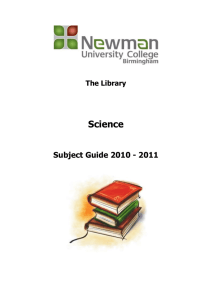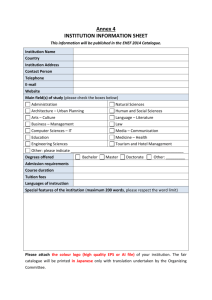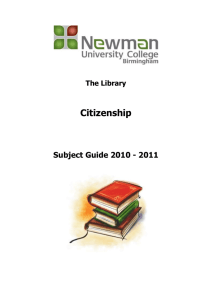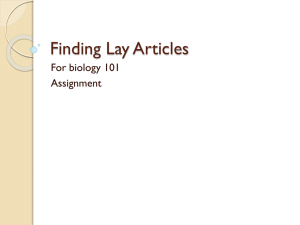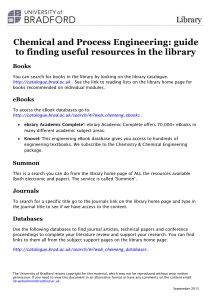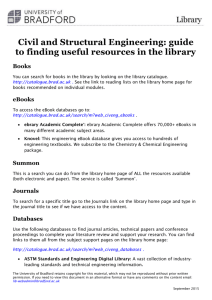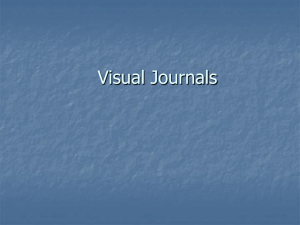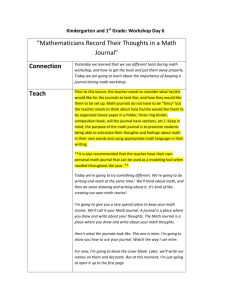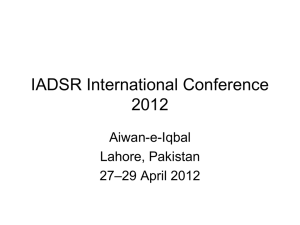Journals
advertisement
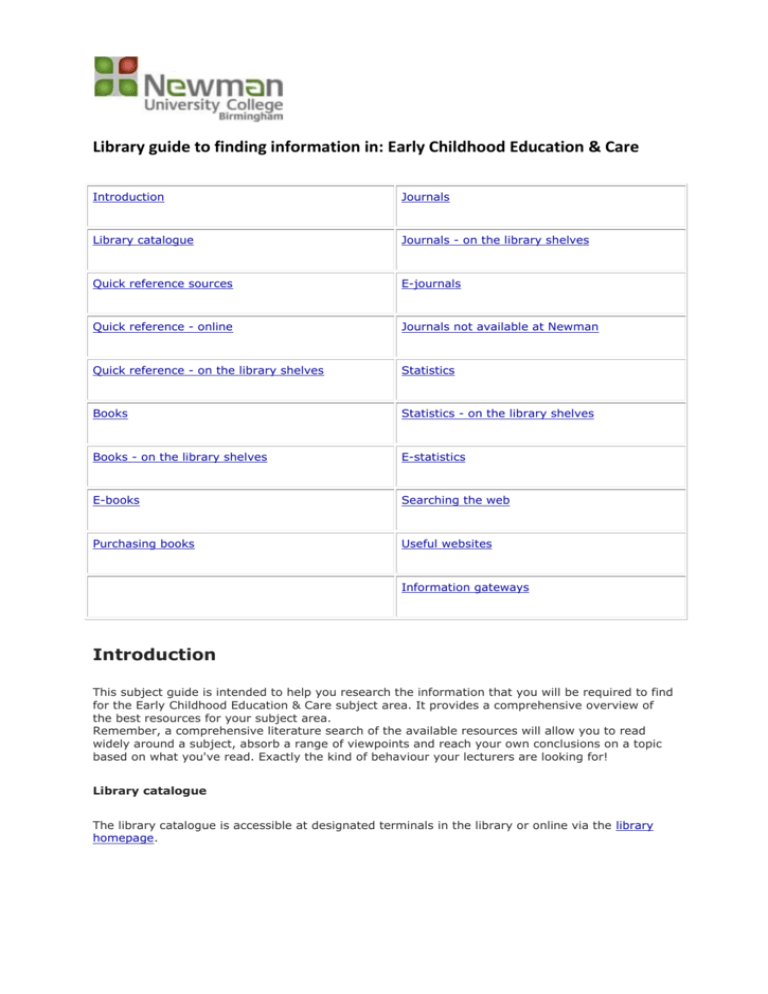
Library guide to finding information in: Early Childhood Education & Care Introduction Journals Library catalogue Journals - on the library shelves Quick reference sources E-journals Quick reference - online Journals not available at Newman Quick reference - on the library shelves Statistics Books Statistics - on the library shelves Books - on the library shelves E-statistics E-books Searching the web Purchasing books Useful websites Information gateways Introduction This subject guide is intended to help you research the information that you will be required to find for the Early Childhood Education & Care subject area. It provides a comprehensive overview of the best resources for your subject area. Remember, a comprehensive literature search of the available resources will allow you to read widely around a subject, absorb a range of viewpoints and reach your own conclusions on a topic based on what you've read. Exactly the kind of behaviour your lecturers are looking for! Library catalogue The library catalogue is accessible at designated terminals in the library or online via the library homepage. You can search the catalogue by keyword, title, author or year. The keyword option is especially useful for searching a particular subject as it performs a flexible search. From the drop-down box on the opening screen of the catalogue, you can also opt to search a particular collection of resources. For example: • Journals – searches the journal titles available in the library. For references to specific articles you should use the electronic bibliographic databases and online journals. • School Experience – searches for teaching materials such as lesson plans, topic books, kits and artefacts. An online help guide to using the catalogue is available (click on the Help tab in the library catalogue). There is also a tutorial on the Library Zone page of Moodle How to find items in the library but if you need any further help please ask a member of library staff. Quick reference sources Quick reference sources, which are available in the General Reference Collection in the library and online, provide a useful starting point for your research. Sources include encyclopedias, dictionaries, handbooks, directories and yearbooks and you can use them to find: • Explanations and definitions of particular terms or topics. • Contact addresses or information on people or organisations. • Factual and statistical information. The examples selected for this guide will help you get to grips with some of the terminology you will encounter while studying Working with Children, Young People and Families: Online The library subscribes to the following services which can be accessed from the E-Reference section of the Electronic Resources page on the library website: • Britannica Online – Academic Electronic version of this authoritative encyclopedia. Also links through to full-text journal articles on topics covered in the encyclopedia. • Oxford Reference Online - Quick reference information together with authoritative, in-depth articles. Contains the full text of over 130 dictionaries, plus an encyclopaedia, thesauri, and guides to English grammar and usage. Includes a wide range of additional material such as maps, illustrations and timelines. On the library shelves You will find the following and many others in the General Reference Collection: • Education Yearbook 2008/2009 - The UK’s most comprehensive source of information on professionals in the education arena. Areas covered include: Voluntary Service and Groups for Children and Young People, Educational Visits and Special Needs Organisations. • The New Walford Guide to Reference Resources: Volume 2 the Social Sciences - Points you to an expertly chosen selection of key, quality resources – accessible electronically and in print. Sections include: Social Work and Social Welfare, Sociology, Education and Learning and Government. Books On the library shelves The Library uses the Dewey decimal system to classify and arrange its books by subject. The catalogue will give you the shelf number of the book you need, and tell you if it is in the library or out on loan. The following are some examples of shelf numbers relevant to Working with Children Young People and Families: Abused and neglected children 362.76 Bullying 371.58 Child development - general 305.231 Child development - psychological, cognitive, social 155.4 Child development - physical 612.65 Children and society 362.7 Citizenship 370.115 Creativity in the Early Years 370.157 Early years education and care 372.21 Educational research 370.78 Emotional difficulties - pupils 371.94 Government control in education 379.15 Health promotion 362.1 Health - children 362.19892 Inclusion 371.9046 Multicultural and bilingual 371.97 Primary education 372 Psychology 150 Psychology - education 370.15 Pupil guidance and counselling 371.4 Secondary education 373 Social policy 361.61 Sociology 301 Sociology - education 370.19 Special needs and advocacy 371.9 Study skills 378.17 Teacher/parent relations 371.103 E-books Some of the library’s most popular texts are now available to you electronically through our e-book service provided by Dawsonera. Dawsonera can be accessed from the E-books section of the Electronic Resources page on the library website . You will need to be logged into Athens to access the full-text books which the library has purchased (details can be found in the Athens information section of the Electronic Resources page on the library website). Individual titles can also be accessed via the library catalogue. Purchasing books For some modules you may be required to purchase some or all of the texts from the ‘essential reading’ on your reading lists. You may find the following retailers useful: Abebooks - Online bookshop especially useful for second hand and out of print books. Amazon - Online books, often much cheaper than RRP! Waterstones - Search and buy online or try their branch located on the University of Birmingham Edgbaston campus – they often have textbooks in stock that are difficult to obtain from elsewhere. Telephone them on 0121 472 3034. Journals Journals are an excellent source of information. They show evidence of wider reading, are important for research and help you to keep informed of any changes and developments in the study of your subject area. They are published more frequently than textbooks, so the information they hold is often more up-to-date. Tutorials and guides to finding Journal articles are available on the Library Zone page of Moodle. On the library shelves You can search for journal titles on the library catalogue by selecting ‘journals’ from the drop-down collections box on the search screen. The journal collection is for reference only, so titles should always be accessible. They are shelved alphabetically by title in the Journal room. Examples of titles that you may find useful for the Early Childhood Education & Care subject area are: British Educational Research Journal Children and Society Children and Young People Now Childhood Child and Family Social Work Community Care Early Years: An International Journal of Research and Development International Journal of Early Years Education E-journals The library subscribes to many different online journal services, all of which are accessible from the Databases and e-journals section of the Electronic Resources page on the library website. There is a useful tutorial Finding e-journals on the Library Zone page of Moodle. For Early Childhood Education & Care, you will find the following services particulary useful: Education Research Complete The definitive online resource for education research. Topics covered include all levels of education from early childhood to higher education, and all educational specialties, such as multilingual education, health education, and testing. Education Research Complete provides indexing and abstracts for more than 2,100 journals, as well as full text for more than 1,200 journals, and includes full text for nearly 500 books and monographs. Childlink Database focusing on Legislation, Policies and Practices regarding children, young people and families with information on Education, Welfare, Lifestyle, Justice, Benefit Issues, Youth Affairs, Health and Employment. Swetswise Full-text articles from a range of journals, including titles currently held in hard copy in the library. Journals A-Z List This is a complete listing of every journal that the library subscribes to both in print and electronic formats. You can search this database by journal title only; article level searching is not possible here. If we have access to the journal in print you will be linked through to the library catalogue and if we have electronic access to the journal, it will link you through to the relevant database or online journal service.This list is particularly useful if you have been given a reference to a journal article that you would like to use in your research and you need to know if the library subscribes to it. You will need to be logged into Athens in order to be able to access most of these resources, details can be found in the Athens information section of the Electronic Resources page on the library website. Journals not available at Newman We may be able to provide an article from a journal that we don’t have in the library via our interlibrary loans service. Please ask at the Enquiry desk or email: library-enquiries@newman.ac.uk for details. This service incurs a small charge and is also available for books. If the journal articles you require are held in a university library near to you, you can visit that library to access their journals through the SCONUL Access scheme. You can find out which universities have the journals you need by checking the library catalogue of individual institutions or by checking Zetoc the British Library's table of contents. A list of other univeristy catalogues is available on the Electronic resources page of the Newman library website. Statistics Statistics underpin many academic debates about quality, standards, equal opportunities and the overall effectiveness of Government policy. You can use them in assignments or research to add weight to your arguments. On the library shelves • Social Trends - Produced by the Office for National Statistics, annually. Provides a comprehensive guide to UK society, illustrating how our lives have changed over the years and also reflecting the realities of contemporary lifestyles. • Annual Abstract of Statistics - Produced by the Office for National Statistics. An annual publication containing a comprehensive collection of statistics about the UK’s economy and society including population, national accounts and government finance, the labour market, health and social protection, education, crime, environment, transport and many other subjects. E-statistics UK Statistics Authority Oversees the Office for National Statistics (ONS). Provides links to government sites to find the statistics of your choice. Sections include Neighbourhood, Economy, Census and Population. DCSF National Statistics Department for Children, Schools and Families Analytical Services produce a wide range of statistics covering education, training and life-long learning. UNESCO Institute for Statistics Global and internationally comparable statistics on education, science, technology, culture and communication. The Guardian Datastore Governments around the globe are opening up their data vaults – allowing you to check out the numbers for yourself. This is the Guardian’s gateway to that information. Search for government data here from countries, cities and states around the world. Searching the web Useful Websites- There are a number of carefully selected websites relevent to Early Childhood Education & Care in the General Education section of Intute. Information gateways Information gateways gather internet resources which are carefully selected, indexed and described by subject specialists. You may find the following gateway useful for the Early Childhood Education & Care subject area: Intute - With millions of resources available on the Internet, it is difficult to find relevant and appropriate material even if you have good search skills and use advanced search engines. Issues of trust, quality and search skills are very real and significant concerns - particularly in a learning context. The Intute database makes it possible to discover the best and most relevant resources in one easily accessible place. You can explore and discover trusted information. The database is split into broad subject areas; the most relevant for Early Childhood Education & Care are the 'Education and Research Methods' and ‘Social Sciences’ sections and they can be accessed from the Information Gateways section of the Electronic Resources page on the library website. August 2010.
